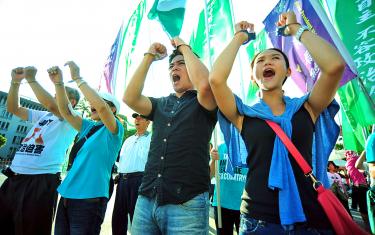More than 100 supporters of former president Chen Shui-bian (陳水扁) marched through Taipei yesterday, highlighting their demand that the government uphold his human rights.
The protesters, led by a new activist group called the Taiwan Democratic Human Rights Platform, called for the government to grant Chen medical parole so he could receive treatment at home.
“Defend medical human rights, grant A-bian (阿扁) home medical treatment,” the demonstrators shouted as they carried green and white banners bearing messages that decried political prosecution, with a squad of tricycles carrying large flags leading the way.
The group said Chen’s deteriorating health should have warranted medical parole long ago and that the former president was being denied home care for political reasons.
Taipei Veterans General Hospital physician Kuo Cheng-deng (郭正典), a member of Chen’s volunteer medical team, was among the many demonstrators who wore handcuffs during the rally in protest of Chen’s incarceration.
At one point, the procession arrived in front of Democratic Progressive Party (DPP) headquarters. Raising their handcuffed fists above their heads defiantly, in a gesture similar to one Chen made when he was first taken into custody in 2008, the demonstrators called on the DPP to live up to its pledge to fight for Chen’s medical parole.
The crowd congregated on Ketagalan Boulevard in front of the Presidential Office Building in the evening, demanding that President Ma Ying-jeou (馬英九) stop what they see as the political prosecution of his predecessor.
The parade was the final event in a series spanning the weekend.
A civic forum discussing the legal and medical aspects of Chen’s condition was held at Taipei’s Liberty Square on Friday night, while Saturday night featured an outdoor screening of the suspense-drama film Formosa Betrayed, followed by a candlelight vigil dedicated to Chen’s health.
Chen was taken into custody shortly after he left office in 2008. He is serving a 20-year term for accepting bribes during his eight-year presidency. Chen has been found guilty by the Supreme Court in four corruption cases.
Chen was transferred to a special medical zone of the prison hospital in June, after suffering from multiple complications, including severe depression, sleep apnea, non-typical Parkinson’s disease, a speech disorder and mild cerebral atrophy. He attempted suicide in prison last year, but was stopped by guards, reports from the Ministry of Justice said.
A recent poll conducted by the Taiwan Association for Pacific Ocean Development showed that 64 percent of respondents backed medical parole for Chen, while 23 percent were against the idea.
Source: Taipi Times - 2014/10/20





















